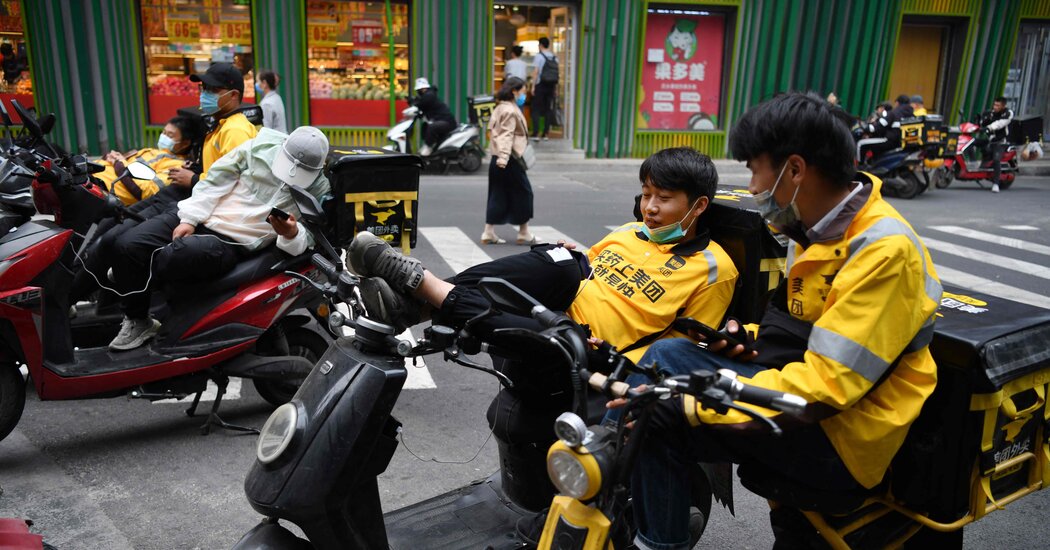
China fined the food-delivery giant Meituan $530 million for antitrust violations on Friday, the second major penalty this year in Beijing’s efforts to bring the country’s big internet companies to heel.
The government’s campaign has been blessed by the highest levels of the Communist Party leadership. It has involved a wide cast of regulatory agencies and policymaking bodies. And it has wiped out hundreds of billions of dollars in wealth for shareholders of some of China’s — and the world’s — most successful tech businesses.
Like regulators and politicians in the United States and Europe, China’s leaders have watched with alarm as internet companies have gained ever-greater influence over commerce, society and everyday life. They want to ensure that these companies do not use their power to gain unfair advantages over rivals or exploit captive consumers.
But Beijing can move with a speed and decisiveness that Western officials can scarcely imagine, knocking down companies and industries with a few swift strokes.
Investors are still waiting to learn the fate of another of China’s most-valuable internet companies, the ride-hailing giant Didi. Days after Didi listed its shares on the New York Stock Exchange in late June, Chinese regulators ordered the company to stop signing up new users and pulled its apps from mobile stores, citing cybersecurity and privacy concerns.
In a statement posted on Chinese social media, Meituan said it would accept the penalty “with sincerity” and “take this lesson to heart.”
China’s leader, Xi Jinping, has rattled the business world this year with a far-reaching campaign to strengthen state control over the economy. The Communist Party wants to curb business activity that it sees as inequitable or corrupt and to push entrepreneurs and tycoons to share more of their wealth with the rest of society.
Beijing’s first big antitrust penalty against a tech company was imposed in April on Alibaba, the e-commerce titan co-founded by Jack Ma, one of the richest people in the world. The government’s market watchdog, the State Administration for Market Regulation, fined Alibaba $2.8 billion for preventing the merchants on its shopping sites from selling on other platforms.
That amount — a record fine for violating China’s antimonopoly law — represented 4 percent of Alibaba’s domestic sales in 2019.
On Friday, the same agency fined Meituan for similar anticompetitive practices, namely the use of exclusivity arrangements to block restaurants from offering takeout delivery on other platforms.
The regulator’s penalty on Meituan represents only 3 percent of the company’s sales in China last year. But the agency also ordered Meituan to refund more than 1.6 million restaurants and other merchants for deposits they paid as part of their exclusivity agreements with the platform. The regulator said that if a restaurant violated the agreement, Meituan claimed the right to deduct from the deposit.
Those refunds add up to about $200 million in total, the regulator said. That is the equivalent of a bit more than 1 percent of Meituan’s 2020 sales.
Meituan was founded in 2010 by Wang Xing as a Groupon-like service for buying vouchers from local merchants. Mr. Wang, its chief executive, had previously started and run two social media sites. More than 510 million people used Meituan’s platform last year to order takeout and groceries and book hotels and travel.
Earlier this year, China’s market watchdog penalized Meituan and four other “group buying” sites, where people join up with friends to place bulk orders on groceries and other goods. By burning cash to sell goods below cost, the platforms had harmed small retailers and “violated the normal market price order,” the agency said. Meituan was fined about $230,000.
In July, national regulators ordered food-delivery companies to ensure that their drivers earned at least the local minimum wage. In metropolises like Beijing, Shanghai and Guangzhou, the minimum wage is roughly $300 to $400 a month.
Investors have been on edge about further government actions. In May, Mr. Wang posted a centuries-old Chinese poem on social media about a powerful emperor who fails to anticipate the threats that eventually topple him. Amid Beijing’s tech crackdown, it read like a veiled shot at the government. Meituan’s stock, which trades in Hong Kong, took a dive.
Mr. Wang later explained, in another social media post, that he had been thinking about the poem as he contemplated how the biggest challengers to successful businesses could come out of nowhere.
Soon after, Mr. Wang donated a block of Meituan shares to his charitable foundation. Several prominent Chinese tech moguls have felt the pull of philanthropy lately — a way, perhaps, to deflect the growing skepticism about their wealth and power. Others have relinquished top jobs or are keeping a low profile.
Colin Huang, founder of the e-commerce giant Pinduoduo, pledged $100 million for scientific research through his foundation in March, a day after he resigned as the company’s chairman. In June, Zhang Yiming, the founder of TikTok’s parent company, ByteDance, put $77 million toward education in his hometown in Fujian Province. That was shortly after Mr. Zhang said he would step down as ByteDance’s chief executive to focus on long-term strategy.
Albee Zhang contributed research.



